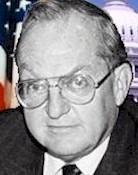Re: patent reform bill and PTO reauthorization.
Date: March 25, 1999.
Source: House Judiciary Committee.

| Opening Statement by Rep.
Howard Coble (R-NC). Re: patent reform bill and PTO reauthorization. Date: March 25, 1999. Source: House Judiciary Committee. |
 |
|
|
|
||
STATEMENT OF THE
HONORABLE HOWARD COBLE
REGARDING
A COMMITTEE PRINT OF THE "AMERICAN INVENTORS'
PROTECTION ACT"
AND
H.R. 1225, THE "PATENT & TRADEMARK OFFICE REAUTHORIZATION ACT, FISCAL
YEAR 2000"
MARCH 25, 1999
Good afternoon. The Subcommittee will come to order.
Technology now provides about two-thirds of productivity gains for workers on the job, and about one-third of U.S. economic growth. That means better-paying jobs for now and more jobs for the future. But to realize this vision, science must move apace out of the laboratory, through the Patent and Trademark Office, and onto the factory floor.
To advance American technology, strengthen our nation's global competitiveness, and to reward inventors on a more timely basis, we can't live with a patent system much of whose structure predates even the emergence of biotechnology, semiconductors, software, Internet and electronic commerce applications, and other high-growth technologies. This is not a big versus small debate. It is about making sure that the U.S. patent system is not undermined by our inaction. Reforms of the U.S. patent system are needed now. Our nation can ill afford for Congress to delay any further in enacting comprehensive amendments to our Patent Act, its predecessor being the fifth law that President George Washington ever signed.
In furtherance of this modernization goal, the Subcommittee and our witnesses will examine two bills at today's hearing: a Committee Print of the "American Inventors' Protection Act," and H.R.1225, the "Patent and Trademark Office Reauthorization Act, Fiscal Year 2000."
The Committee Print is a 96-page work-in-progress; it contains many of the same provisions that were included in H.R. 400 and S. 507 from the previous Congress. It also contains revisions that have been suggested by two of our witnesses today, Representative Rohrabacher and Representative Campbell. Our staff will continue to work with these gentlemen and other interested parties to develop a more finished product that should generate consensus support from the patent and trademark communities. Once this work is complete, a bill will be introduced.
The Reauthorization bill is premised on the same policy goal as last year's version, H.R. 3723; namely, to prevent the diversion of revenue generated by special surcharges from the Patent and Trademark Office. The point of the bill is straightforward and necessary: to allow the agency to keep all of the revenue it raises in user fees to benefit American inventors and trademark holders.
I now turn to the Ranking Members from California, Mr. Berman, for his opening statement.